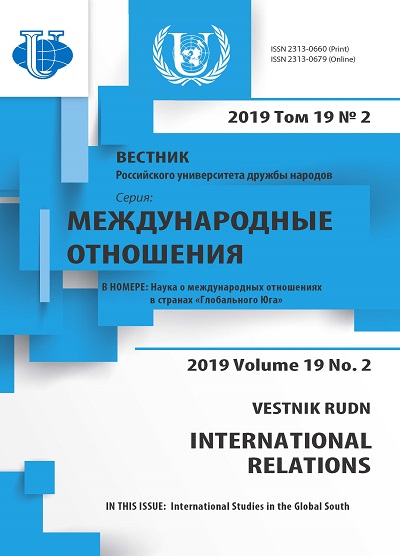Book Review: Shahi, D. (2018). Kautilya and Non-Western IR Theory. Palgrave Pivot, 167 p
- Authors: Kanisetti A.V.1
-
Affiliations:
- The Takshashila Institution
- Issue: Vol 19, No 2 (2019): International Studies in the Global South
- Pages: 320-323
- Section: REVIEWS
- URL: https://journals.rudn.ru/international-relations/article/view/21471
- DOI: https://doi.org/10.22363/2313-0660-2019-19-2-320-323
Cite item
Full Text
Abstract
-
About the authors
Anirudh V. Kanisetti
The Takshashila Institution
Author for correspondence.
Email: interj@rudn.university
Research analyst
Bangaluru, IndiaReferences
- Bajpai, K. (2005). International Studies in India: Bringing Theory (Back) Home. In: International Relations in India: Bringing Theory Back Home / Ed. by K. Bajpai, S. Mallavarapu. New Delhi: Orient Longman.
- Boesche, R. (2003). The First Great Political Realist: Kautilya and His Arthashastra. Lanham: Lexington Books.
- Burley, M. (2007). Classical Samkhya and Yoga: An Indian Metaphysics of Experience. London and New York: Routledge.
- Gokhale, P. (2015). Lokāyata / Cārvāka: A Philosophical Inquiry. Oxford: Oxford University Press.
- Lamus, F. (2016). Machiavelli’s Moral Theory: Moral Christianity versus Civic Virtue. MA Thesis. Duke University.
- Sarkar, B.K. (1919). The Hindu Theory of International Relations. The American Political Science Review, 13 (3), 400-414.
- Shahi, D. (2018). Kautilya and Non-Western IR Theory. Palgrave Pivot. https://doi.org/10.1007/978-3-030-01728-6
- Sihag, B.S. (2004). Kautilya on the Scope and Methodology of Accounting, Organizational Design and the Role of Ethics in Ancient India. Accounting Historians Journal, 31 (2), 125-148.
- Singh, U. (2002). Political Violence in Ancient India. Harvard: Harvard University Press.
- Weber, M. (1919). Politics as a Vocation. A Speech Delivered at Munich University. In: Max Weber: Selections in Trans¬lation / Ed. by W. Runciman. Cambridge: Cambridge University Press.











